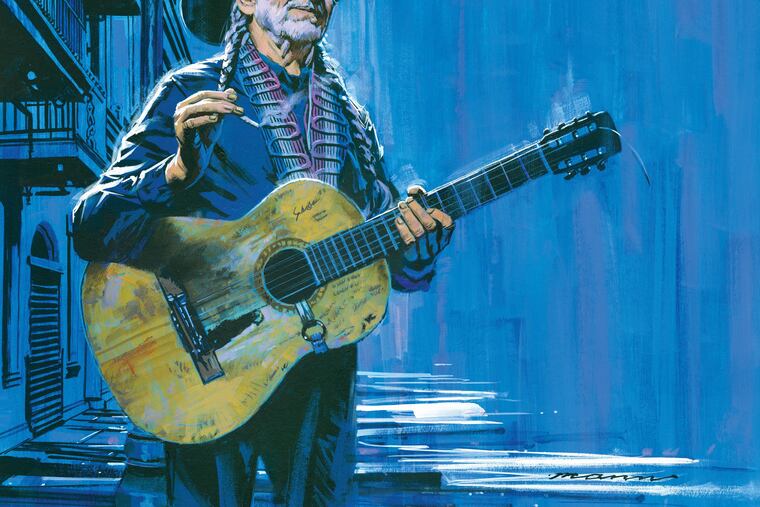Willie Nelson sings Sinatra again, still gorgeously | Album review
Kings of Leon and Scranton's Tigers Jaw also have new releases of note.

Willie Nelson
That’s Life
(Columbia ***)
In the 1970s, Willie Nelson upended expectations by following his breakthrough albums Shotgun Willie and The Red Headed Stranger with a project dear to his heart: Stardust, a set of Great American Songbook standards that turned out to be an enormous success.
It also got the attention of one of his favorite artists. “That cat is a blues singer,” Frank Sinatra said at the time. “He can sing my stuff, but I don’t know if I can sing his.”
Nelson, who turns 88 next month, remains astonishingly productive. This is the eighth album he’s released in the last five years, and the second of songs associated with Sinatra, following 2018′s My Way. This new album’s cover painting is an homage to Ol’ Blue Eyes’ melancholy 1955 masterpiece In the Wee Small Hours.
Like My Way, That’s Life is a collaboration with Nashville producer Buddy Cannon and pianist Matt Rollings, a former member of Lyle Lovett’s Large Band. The arrangements put Nelson in a satisfying, sentimental comfort zone that never strains too hard to reinvent standards like “I’ve Got You Under My Skin” and “Luck Be a Lady.”
Instead, Nelson puts his own spin on the songs naturally, with his sui generis sense of ease that comes across in everything he talks-sings. He swings effortlessly, just a touch behind the beat.
Among the treats are a frisky “I Won’t Dance” with Diana Krall, and the title cut, which Nelson is characteristically gentle with, recounting a lifetime as “a puppet, a pauper, a pirate, a poet, a pawn, and a king.” That’s Life also wisely includes deep cuts that aren’t so familiar, like the forlorn “Cottage for Sale” and the weary “Lonesome Road,” a subject that Nelson knows more than a thing or two about.
— Dan DeLuca
Kings of Leon
When You See Yourself
(RCA, ** 1/2)
Although recorded pre-pandemic, Kings of Leon’s When You See Yourself feels remote, contained, and lonely. The Followills (three brothers and a cousin) went from being the Southern Strokes to arena-rock stalwarts after the success of 2008′s Only by the Night. But their increasing love of texture and atmosphere rather than the rock riffs that they do so well dilutes When You See Yourself, their eighth album.
As on 2016′s Walls, the Followills enlist producer Markus Dravs (Arcade Fire, Florence + the Machine) and keyboardist Liam O’Neil, and the arrangements often push O’Neil’s synthesizers and Jared Followill’s bass to the forefront, suppressing the impact of Caleb’s vocals and Matthew’s guitars.
Many of the midtempo songs, such as the slowly pulsing “100,000 People,” stay in one place for their duration. “I’m going nowhere, if you’ve got the time,” Caleb sings on “Supermarket,” and although it’s an invitation, it comes across as half-hearted, especially from a band that has written a clutch of great driving songs.
The pace picks up occasionally, on U2-lite rockers such as “Golden Restless Age” and “The Bandit,” but the hazy, thick production mutes them. They’ll probably sound great when (if?) heard in an arena. Only “Echoing” has some of the band’s former swagger, but coming near the end of the often-plodding When You See Yourself, it feels like an afterthought.
— Steve Klinge
Tigers Jaw
I Won’t Care How You Remember Me
(Hopeless Records ***)
Gone are the days of house parties and basement shows, standing shoulder to shoulder with people to see your favorite local band. Yes, because of the pandemic, but for Scranton-based band Tigers Jaw, those days were already behind them.
What began as a group of high school friends eager to play music has evolved into a dynamic collective of skilled musicians, and here their blended talents bring fans the strongest album yet.
In I Won’t Care How You Remember Me, the band’s sixth album, they continue their departure from the iconically whiny vocals of 2008′s Tigers Jaw with emotion-charged stories of accepting hard truths in 11 lyric-driven songs. Ben Walsh and Brianna Collins split the album’s vocals but often tell a similar narrative of strained relationships and coming to terms with them.
In Collins’ first vocal appearance on the album, “Cat’s Cradle,” she sings about a crumbling bond she realizes she can’t save. “If there was something I could do,” Collins sings, “it’s not enough for you.”
In “Body Language,” Walsh captures the intimacy of drifting apart. “How I used to memorize your movements. Now I can’t pick you out of a crowd.”
The album was recorded and produced at Studio 4 Recording in Conshohocken, and the stories are enhanced by Will Yip’s talent for stripping away the unnecessary to let the lyrics live and breathe.
I Won’t Care How You Remember Me is a polished and profound version of the sound they’ve been refining for years.
— Kristen Balderas